It’s been ten years since The L Word premiered, and we’ve got lots to talk about. Welcome to The L Word week!
Colombian native and Modern Family star Sofia Vergara made $30 million last year, making her the highest-earning actress on TV. Oh yay, a Latina making more money than a white person! However, it’s not much of a triumph when you realize Vergara only finds success on the coattails of the broad, generalized ideas of Latin@ Folks that have been perpetuated by racism and sexism throughout the history of American media. She is a prime example of what Hollywood wants in a Latina character: voluptuous body, luscious dark hair, and a loud personality with a thick accent. Maybe that’s why she is so desired in the media world; along with her acting career, she has numerous — mostly bilingual — endorsement and commercial deals that contribute to her huge salary.
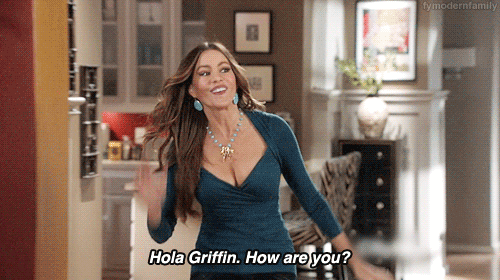
For years, the media has regurgitated the same stereotypical portrayals of Latinas. They rarely play anything that isn’t a maid/nanny/domestic help, an immigrant, a criminal or a sultry lover. So when The L Word debuted not one lesbian Latina character but two lesbian Latina characters throughout its run on Showtime, Latinas everywhere should’ve rejoiced for these unprecedented roles, right? Nope. Nope. Nope.
The truth is Carmen and Papi are Latina characters who continue to perpetuate sweeping generalizations about Latin@ Folks in the media and even created more damage for queer Latin@ Folks. Yes, you drooled over Carmen and laughed at Papi’s ridiculousness, but I’m here to tell you why these two characters are an insult to Latin@ Folks. Let’s explore how and why these characters were problematic.
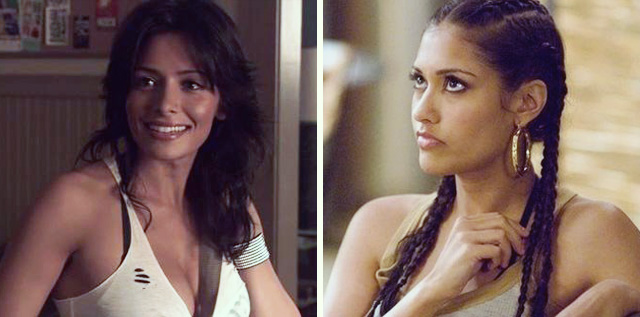
Ok, sit down, I need to tell you something important. This may come as a shock to you — because believe me I was baffled, straight-up blindsided, because I didn’t know this till now — that Sarah Shahi, who plays Carmen, and Janina Gavankar, who plays Papi, are not Latina. Shahi is from Texas and apparently Iranian royalty from her father’s side and part Spanish from her mother’s side. Gavankar is from Illinois and is part Indian and part Dutch. In 2004 when the L Word first premiered, there were more than 40 million Latinos living in the United States (which has increased by 10 million today) yet Ilene fucking Chaiken could not find two Latinas to be in her show. If you’re filming a show based on a group of lesbians who live in LA — which half of its population is Latino — there is absolutely no excuse not to incorporate Latinas into the show.
This of course isn’t the actresses’ fault. Shahi and Gavankar are women of color who have to compete with white women for acting gigs that are so often tailored for white women. More doors are open for Shahi and Gavankar when they can be “racially ambiguous” and play any woman of color, and they deserve all the work they can get. So playing Latinas are not their fault, it’s Hollywood’s fault. The white, male-dominated TV and film industry think being brown is all the same. To them, here’s no difference between being Dominican and Mexican or being Puerto Rican and Cuban. All you have to do is slap on an accent, throw around a few words like “quinceañera” or “mofongo,” add some Latin beats in the background and now no one can tell the difference. This reduces unique cultural identities to what white people perceive them to be and creates stereotypes.
So we’re off to a bad start already and we haven’t even talked about the characters.

Exhibit A: Carmen de la Pica Morales
Saucy. Fiery. Hot. Spicy. I’m not describing the delicious salsa roja I made for my breakfast tacos this weekend. These adjectives are repeatedly used to describe Latinas in the media. Never: intelligent, confident, ambitious, creative, etc. These words that reduce Latinas to their bodies and sexuality is deeply rooted in a history of white people exoticizing and sexualizing women of color. Scholars Isabel Molina Guzmán and Angharad N. Valdivia explain in their research of Latinidad in U.S. pop culture, the parallel between whiteness and non-whiteness vs. intellectual function and nature.
“For centuries the bodies of women of color, specifically their genitals and buttocks, have been excessively sexualized and exoticized by U.S. and European cultures (Gilman, 1985). Not surprisingly popular images of Latinas and the Latina body focus primarily on the area below the navel, an urbane corporeal site with sexualized overdetermination (Desmond, 1997). Within the Eurocentric mind/body binary, culture is signified by the higher intellectual functions of the mindibrain while nature is signified by the lower biological functions of the body. That is, Whiteness is associated with a disembodied intellectual tradition free from the everyday desires of the body, and non-Whiteness is associated with nature and the everyday needs of the body to consume food, excrete waste, and reproduce sexually. Dominant representations of Latinas and African American women are predominately characterized by an emphasis on the breasts, hips, and buttocks. These body parts function as mixed signifiers of sexual desire and fertility as well as bodily waste and racial contamination. Contemporary Latina iconicity inherits traces of this dichotomous representational terrain.”
Latinas and Latina characters bodies are so often “othered,” it’s their marginalization that sexualizes them. Modern day evidence of this is demonstrated by the “sexy” roles that Salma Hayek, Zoe Saldana, Jennifer Lopez, Eva Longoria, Rosario Dawson, Eva Mendez, even Michelle Rodriguez play on screen.
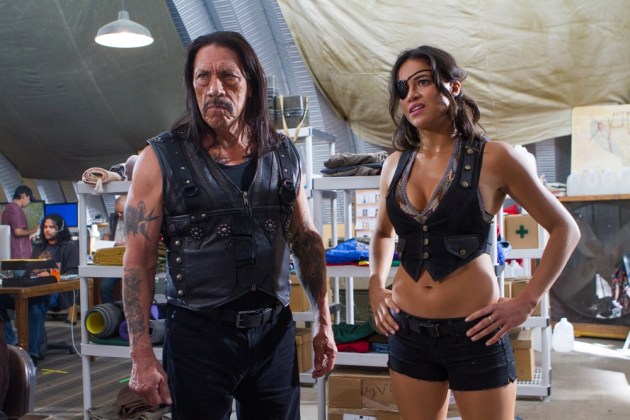
Carmen’s character is no exception. Carmen was introduced in the second season as the super hot DJ whom Shane instantly had an attraction to, or at least fucked right away. Even though Carmen went out with Jenny for a while (I know, we all forget that happened), she only existed to be Shane’s sexy lover.
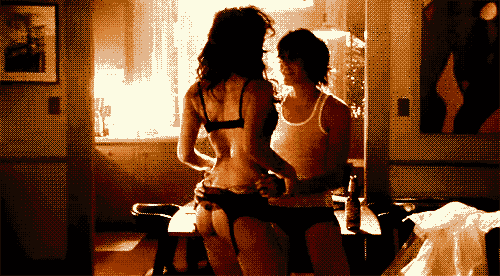
“But Yvonne, The L Word is all about sex, so it’s ok that we revel in Carmen’s hotness.”
There’s nothing wrong with being a beautiful, sexy, curvy Latina; the problem is that it seems that these were the main attributes found in the only Latina character on the show during those seasons. When Latinas’ bodies are continually objectified, on top of their culture that is already sexually oppressive, they are robbed of their sexual agency, reduced to nothing more than a body to be desired.
Carmen was a supporting character to Shane’s character arc, so of course Carmen’s not going to get a complex back-story of her own. But even when we get glimpses of Carmen’s life besides her “working” aka dancing with one hand on her headphones behind a DJ turntable, it is a white-washed portrayal of a Mexican-American. From her horrendous Spanish-speaking skills (Carmen had a Spanish-speaking mother, her Spanish should’ve been better than that!) to that sorry-ass quinceañera they went to, Carmen’s culture was not accurately represented.
Carmen’s mom is probably the most real Latina representation in The L Word. This scene is pretty realistic; unfortunately, I’m pretty sure lots of conservative Latina moms have said this to their lesbian daughters: “A whore is better than a lesbian.”
Once Shane left Carmen at the altar, there was no need for Carmen, her character arc ended when her relationship with Shane ended. (However, the arc also had to end because Sarah Shahi wanted to leave the show for other opportunities.)

Exhibit B: Papi
Without a Latina character on the show, I guess Ilene fucking Chaiken realized there was a glaring role missing on a show set in LA, so to compensate she incorporated one giant Latino caricature.
Papi was introduced in Season Four as the limo driver who slept with the most women according to Alice’s chart. Papi (meaning “daddy” in Spanish) is a womanizer, an irresistible lady charmer that says things like, “I can make a woman come just by kissing her.” Papi is just a lesbian version of what Latino actors have been typecast as for almost a century: the Latin Lover.
Institutionalized by actor Rudolph Valentino in the 1921 film The Four Horsemen of the Apocalypse, the Latin Lover archetype is just another product of eroticizing and sexualizing Latinos. The Latin Lover is usually a muscular, handsome, seductive, suave man — basically just think of almost every role Antonio Banderas has ever played, including Puss in Boots.
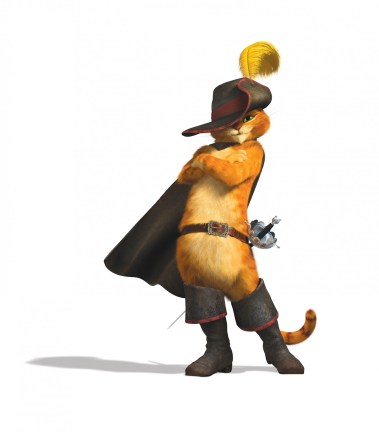
But the Latin Lover’s most prominent characteristic is his “primal sexuality” — most noticeable when juxtaposed next to the white lady he’s trying to mack on. In Latino Images in Film: Stereotypes, Subversion and Resistance, Charles Ramirez Berg explains how Valentino established this stereotype and its role.
“Valentino’s smoldering presence in these films created a basis for the Latin lover as the possessor of a primal sexuality that made him capable of making a sensuous but dangerous — and clearly non-WASP — brand of love…In these roles, the actors haplessly reiterate the erotic combination of characteristics instituted by Valentino: eroticism, exoticism, tenderness tinged with violence and danger, all adding up to the promise that, sexually, things could very well get out of control.”
And this is exactly a summation of Papi’s character. We see this reflected in her very first appearance on the show when meeting Alice for the first time. After having dinner and talking for a while, Alice and Papi have sex.
Okay, I feel Alice was a pretty experienced sexual person, but Papi comes along and goes down on her and suddenly Alice is having this uhhh-mazing sex? No. This is just Hollywood writers playing into the Latin Lover stereotype. Papi’s only role in this scene is to help find a white woman’s “unbridled sexual desires,” to have carnal passionate sex and overall please a white woman.
On top of her Latin Lover identity, Papi was made into a glamorized chola stereotype, characterized by her fake East LA accent, her street-wise attitude, her signature braids and hoop earrings. I don’t doubt there are chola lesbianas in East LA but Papi’s character didn’t depict an actual chola. She hung out with white, wealthy lesbians for crying out loud! This all goes back to Latinos playing the same roles on screen; in this case, chol@s are often associated with being criminals and gang members.
Overall, Papi’s character is as offensive as white sorority girls throwing a fiesta-themed party complete with sombreros and fake mustaches. Papi is an over exaggeration of the most often used stereotypes, the Latin Lover and an East LA chola. Papi was never meant to be more than just a ridiculous character to laugh at. Every time Papi walks into a room Latin music starts to play? The music doesn’t make her any more or less Latina. Papi can like country music and still be a god damn Latina.
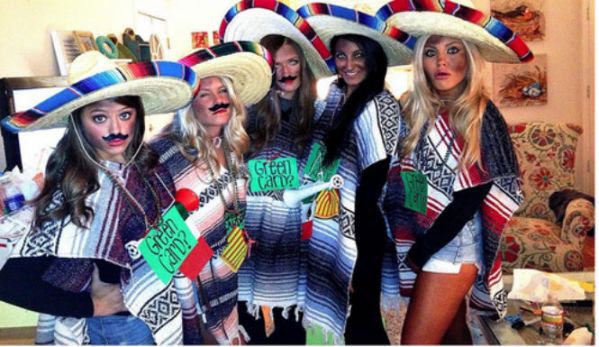
Carmen and Papi’s roles were dismal, just like the current situation of Latino representation on TV. In GLAAD’s “Where Are We In TV” recent report, only 5 percent of broadcast series regular characters are Hispanic or Latino, but 16.3 percent of Americans are of Hispanic or Latino origin, making Latinos “one of the most underrepresented ethnic populations in American media.” As you can imagine from that stat, there aren’t that many LGBT Latin@ Folks depicted on TV. According to GLAAD’s report, there were only two LGBT Latinos on broadcast TV and five on cable in 2013-2014. Only seven queer Latinos out there to represent the multi-faceted brown rainbow. Aye, no.
Why is this particularly horrible? Because according to the National Hispanic Media Coalition’s most recent national poll, non-Latinos learn about our culture from TV, so that means they know NOTHING about us. NOTHING.
“In other words, television has a large role to play in building an understanding that Latinos are an integral part of the American fabric. For this reason I urge the networks to continue striving for greater inclusion until television starts to look more like the actual U.S. demography, and networks must staff more Latinos in back of camera to achieve balanced and accurate portrayals,” NHMC President Alex Nogales said in the GLAAD report.
So you see, the kinds of Latin@ characters we see on screen impact the way we perceive actual humans in the real world. Carmen and Papi’s characters had a chance to really shine and break the mold of Latina stereotypes on TV but instead were so disappointing. Latinos are a fucking diverse group of people with a whole range of skin colors, hair types, body types, backgrounds and cultural experiences. If people see the same tired stereotypes, it erases and homogenizes the vast experiences of Latin@ Folks, giving the public watered-down characters with the same story lines.
What I want to see on screen are honest, queer Latin@ depictions, like Aurora Guerrero’s Mosquita y Mari, which happens to be set in East LA.
This is just one example, but these kind of portrayals of Latin@ Folks are real and speak for the communities they represent.
With 50 million Latinos living in the United States — all with an array of stories to tell — there’s no shortage of inspiration for authentic characters on TV and film.




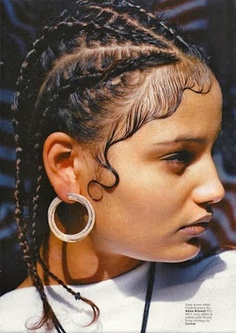
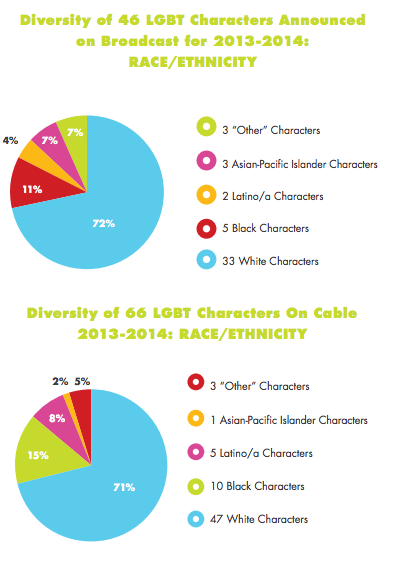




Comments
I too was pissed they used Sarah as a Latin character; but, that comes from being Iranian and wishing they used her you know as a Iranian character(which there is a reasonable size community out here in LA). They couldn’t find a real Latina to fill that role? It was perplexing to me. I will be honest, I didn’t know Papi wasn’t Latina.
Yo, as an Iranian queer, I feel this. We call it Tehrangeles for a reason.
Thank you for this. These are ideas that need to be expressed and looked at and you did an amazing job. And you gave me another excuse to rewatch The L Word (like I needed one)
God Sarah Shahi’s Spanish was just bad. I think very often actors tend to overestimate their language skills.
Something I’ve never understood is: were they looking for Hispanic actresses specifically? Or they just liked the actresses and thought “hey let’s make them Hispanic!”. Because I don’t see why they couldn’t have just made Sarah Shahi a Persian-American lesbian and Janina Gavankar a Indian-American lesbian. Like, what’s stopping them? And how often do we see Persians and Indians on tv? Seriously, the whole thing is just offensive and a missed opportunity.
Exactly, and in LA, it would seem believable, seeing as we have a small portion of town called Little Tehran/Tehrangeles and various areas with a flourishing Indian, Pakistani, Bengali communities.
Such an informative and interesting piece, and so relevant even outside the context of the L Word! Thanks for writing this!
thanks to carmen (rios, not de la pica morales) i’ve been rewatching seasons 3-4, and yeah, this is a complete mess. thanks for putting this all together, yvonne.
Thank you for writing this, I’ve been waiting since for someone to mention all of this. When I see Carmen or Papi on a queer Latina representation list in media I just have to roll my eyes.
Thank you for sharing this piece Yvonne :) a must share!
I was JUST talking about this wrt Orange is the New Black. Daya’s family is the randomest mix of various Latin ethnicities: Puerto Rican, Mexican, Dominican, Cuban…they don’t even look anything alike! Drives me insane.
this is so well-written and hilarious, yvonne! i wish i could see ilene chaiken have to explain herself.
Thank you for this article! Everything you’ve said is absolutely true. I work in television and whenever there is discussion around casting a latina woman for a show, her appearance is most certainly brought up. I get assignments that are like “[redacted network] wants a hot latina woman for their next makeover show, find us one”. I’ve never heard a latina woman be described in this industry without someone sexualizing her.
They sell it to us like they’re promoting diversity, but all the networks are really doing is giving you more “flavors” of women to choose from. Oh, you don’t like the busty, Bubbly Blonde? Try spicing it up with our new line of Sexy Latinas! If that doesn’t float your boat, try our Mysterious Arabian Seductress model, or maybe the Bad Ass Asian Fighter Chick is more your speed? Don’t worry, it’s not sexist, because she fights! Like a man does!
I’m quitting soon.
AH, yes, thanks for this article, yvonne!
i don’t think i’ve ever been able to let anyone around me talk about carmen or papi without saying “how is it in a city with such a massive latina population, they couldn’t find someone actually latina to play those characters?” i did actually think that both sarah shahi and janina gavankar worked admirably with what they were given, but i wish they had cast more accurately.
i had the chance to rant on this again recently, anyone watch house of cards? notice that the “latina” white house chief of staff is actually hindu-american?
“i had the chance to rant on this again recently, anyone watch house of cards? notice that the “latina” white house chief of staff is actually hindu-american?”
Yeah, gurrrl I do!
What? I get that Latina/HIspanic can cross different racial lines and the grouping is mainly due to language and geographical location, but what?
Not to discount the point you’re making, but I feel like that’s what Ilene did to basically every.single.character. on the show.
Are we ever gonna stop criticizing ilene chaiken? She made a lot of mistakes but she made a lot of good things too. Lword never represented a filipino queer character, neither as a guest or an extra. Should i be angry about that? Should i hold a grudge over that? I won’t. Lword completed who i am as a queer female. I’m eternally grateful for that.
Aren’t you tired of having to look for yourself in the same white faces and white problems, though?
It’s never been a problem for me because i have never look at it that way. I’m asian and she’s white, Lword’s character looks different than me. Therefore, I cannot relate. Etcetera, etcetera. When i watch a homosexual themed shows,
I don’t look at the color of the skin. I look at the story of the characters in the show. Ethnicity is not an issue to me. You have a different opinion? I can accept that. As long as the respect is mutual. have a good one.
Visibility and representation are important, and definitely help many people find comfort in their queerness, and confidence to come out. The L Word did this for lots of people, and I watched it for sure. I’ll watch it again.
That doesn’t mean it was great
or that it couldn’t have been way better or doesn’t deserve to be critiqued. IMHO.
Ilene tried. She screwed up in plenty of ways but she tried. Enough hostility. Ilene has been cursed by the whole lesbian/queer community. You don’t want to credit her for anything? That’s cool by me but Let’s call it quits. The Lword is over. It’s over and it’s not coming back. THE END.
THANK YOU. I was super offended when they casted non-Latinas as Latinas and thought I was the only one who even noticed. Also, Shahi’s Spanish was the actual worst and made me cry laugh. I mean, I do know Latino kids who have poor Spanish but I think that is a whole other topic (assimilation) that Ilene is too dense to even touch.
While we were re-watching the L word I realised that Papi strongly resembled Luna from True Blood and I had to imdb her to check that it was her. When I did I was pretty shocked to find she was neither Hispanic nor Native American…I honestly couldn’t believe the casting department had done it. The fact that the L word did it twice is pretty mind boggling.
Really interesting read, thanks.
Thank you.
When I was watching the l word there were a few times that I was so annoyed with how they represented people of colour that I just switched off.
This was a well written and much needed analysis.
Thank you for this! I really really really like reading articles like this from other people of color because sometimes I feel like there could be more solidarity for people of color instead of fighting or putting down other racial and ethnic groups.
Anyway, I was so. confused. that in L.A. there were barely any Latina and Asian representation on the show, what the fuck? I also had issues of casting of Carmen and Papi and I’m especially sensitive to it because it erases the potential of conversations on what it means to be Latina. This also happened with Afro-Latina actress being cast as black but NEVER as Latina due to colorism, racism, etc. in the Hollywood system and even socially.
Overall I enjoyed it but was critical at the same time. I plan on re-watching the L word this weekend and having a case of the feels because it was the L word that made it possible for me to be happy AND gay.
THIS WAS AMAZING!
THE END.
These types of castings will continue to happen until more people of color who have an expanded view of race and culture work for production and casting companies… Or like what Aurora Guerrero did, make her own film. With all that said, Sarah is so hot. Siiiiiiiiigh.
This was a really good read, and I thank you for writing it. The lack of Latin@ representation really is abysmal.
Also also, errbody needs to watch Brooklyn Nine Nine for a healthy dose of a Latina playing neither a spicy lover nor a feisty bombshell. She just plays an awkward spinster who likes Grandma things. Of course, there is also a feisty Latin bombshell on the cast, but whatever.
There’s also an awesome old black gay man. And Chelsea Peretti, who is totes a lesbian. Yay diversity.
I second the Brooklyn Nine Nine rec – diversity all round! Also the two main women are buddies in the best possible way (I totally ship them, but that’s another story.)
Though I wouldn’t call Rosa a feisty Latin bombshell at all, she’s super scary and badass in her own right, and nobody ever mentions her ethnicity.
Everyone was a walking empty-headed stereotype on the show. I’m pretty sure things only worked out for Ilene because she crafts characters like an old white television executives.
I think the latin@ example is especially profound though, because it was also picked up by other media outlets. I remember Out magazine (I think?) ran a cover with Ay Papi! spread across the cover and I thought to myself, “come on, seriously?”
Thank you for this, it meant a lot to me to read it. I remember hearing Sarah Shahi speak Spanish on the L Word and it both ruining her character for me and making me realize that it clearly wasn’t important that she be in any way a genuine representation of Latinadom.
The media – mostly television – decisively shaped the way I thought about and expressed my cultural identity when I was growing up, as well as the way my mother thinks about about my queerness now. Which can be summed up as identical to the way that Sara/Sada’s mom on the Real L Word reacted to her daughter’s wedding. It’s sad that Sara’s Portuguese mom may have been the closest Ilene got to cultural diversity.
This entire article was the perfect summary of the 3rd chapter of my undergraduate thesis.
SERIOUSLY.
Also shout out to Mosquita y Mari and Cherrie Moraga for doing queer Xicana representation better than Ilene Chaiken.
Ackshually,
Shoutout to all queer POC for doing literally everything better than Ilene Chaiken.
As a white woman (from the an area of the east coast where Latina culture is less represented), this was great and really informative to read. I enjoyed every word, thanks!
This is such an important topic and you’ve done a beautiful job writing about it. I first read this article earlier this week and have been recommending it to anyone and everyone since then. Thanks for such great critical insight!
Oh, and I totally thought the same about the sex Alice had with Papi! I think Alice is the most sexually adventurous person of the show, and these “magic circles” sounded pretty standard, so to see her hyped up reaction was really just kind of annoying.
For the record, the film Mosquita y Mari is set in Huntington Park, not East Los Angeles.